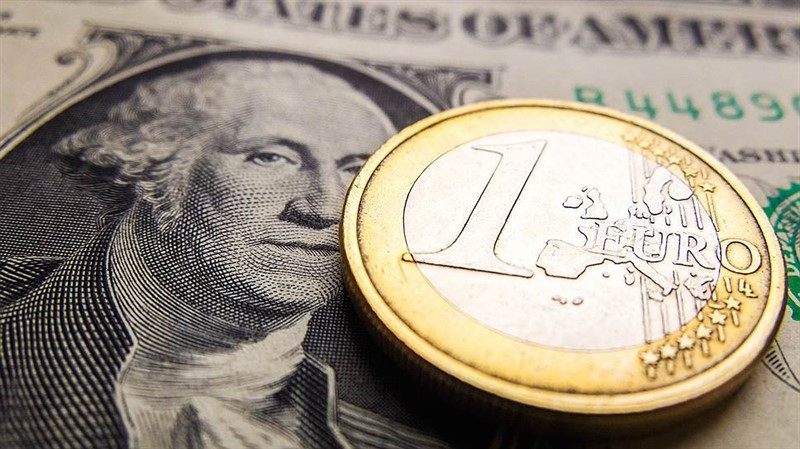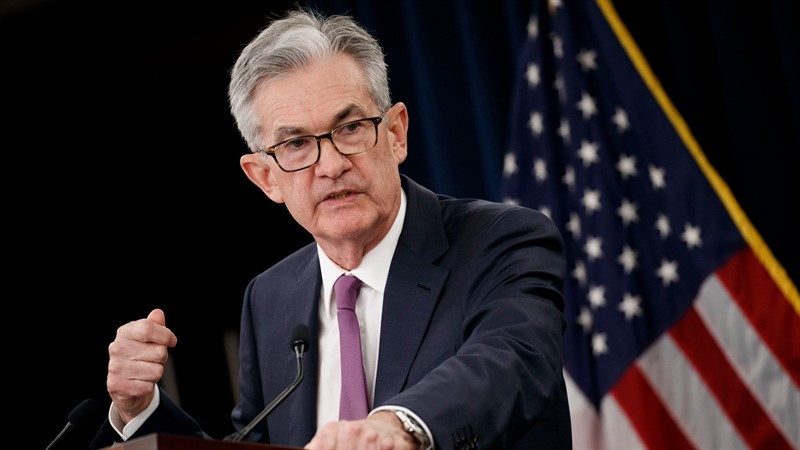
The EUR/USD pair is trading below 1.1300, consolidating its recent losses after the biggest drop in two weeks seen the day before.
Judging by the way the dollar is trading, we can tell that traders are preparing for a faster QE tapering by the Fed, followed by a rise in interest rates.
Meanwhile, the euro, which dropped by 0.4% against the dollar on Thursday, looks vulnerable to higher borrowing in the United States, especially if the interest rates hike in the Eurozone are delayed.
Societe Generale strategists announced their forecasts for the EUR/USD exchange rate for the first half of 2022.
1. Main scenario: 1.09 (50% probability).
This scenario sees the Fed starting to raise rates in mid-2022. The bank is pricing in a cumulative 110 basis point Fed rate hike in 2022-2023 (against +25 basis points from the ECB). It is expected that by the time the US monetary policy tightening begins, markets will be more actively pricing in these expectations, which will cause the EUR/USD pair to fall below 1.1000.
2. Optimistic scenario: 1.15 (25% probability).
If the situation in the global economy develops better than forecasted, it may not only lead to an increase in the Fed's policy tightening forecasts, but also fuel expectations that the ECB will also be forced to follow the example of its U.S. counterpart. This reassessment of attitudes toward the ECB could have a major psychological impact on the market.
3. Bearish scenario: 1.06 (25% probability).
Only an apocalypse could force the Fed to refrain from tightening monetary policy. In such a scenario, all hopes of a tightening of the ECB monetary policy may also disappear, given that the Eurozone economy lags behind the US. If we add risk aversion to this, we will get a more tangible drawdown of the EUR/USD pair compared to the main scenario.
ING experts believe that only hawkish comments by the ECB may tangibly reverse the current situation on the euro in terms of asset purchase timing or economic forecasts. Otherwise, the single currency will continue to face a number of factors that promise weakening at the end of the year.
"A move beneath even the 1.1200 lows is entirely possible. One potential counter-argument is the seasonal tendency of the dollar to underperform in December, although that may require much calmer markets to materialise," the experts said.
However, the markets hope for absence of turbulence as the uncertainty surrounding the new Omicron variant persists.
Bloomberg reported on Thursday, citing research by Japanese scientists that the new strain is 4.2 times more contagious at an early stage than the Delta strain.
At any moment, there may be other evidence that Omicron is still much more dangerous than expected.
The day before, WHO officials said that another 2-3 weeks would be needed to study the new variant of COVID-19 more thoroughly.

The ongoing uncertainty surrounding Omicron is making investors nervous as they wait for decisions on the monetary policy of the leading central bankers.
Next week, the Fed and the ECB will face off when the final regulatory meetings of the year are held.
In military terms, it is limited to maneuvers and statements by representatives of the "general staff."
At a meeting of the ECB planned on December 16, the committee will discuss buying of bonds even after the anti-crisis PEPP program of €1.85 trillion will end, Reuters reported.
It is reported that the details of the scheme have not been fully agreed upon yet.
Among the likely options, ECB commitments will not go beyond 2022, which is a key issue for conservatives, or hawks, who fear that inflation may not fall below the 2% target level, as is now expected.
Nevertheless, some ECB policymakers want to make it clear that asset purchases will continue at least until the end of 2022 in order to suppress expectations of a rate hike.
Meanwhile, the market is waiting for the Fed to announce that it will accelerate the pace of winding down its asset purchase program at the next meeting. The more likely this will happen, the higher the US consumer inflation figure for November will be.
"Inflation is going to accelerate," RBC Capital Markets strategists said, adding that the annual pace is going to rise and keep rising to push near 7% early in the new year.
"As a result, we think that combination means a hike in March is very possible," they said. "The market is pricing in about a 40% chance of that, but we now think it's a bit higher. It's probably closer to a coin flip now."

Recent comments by Fed Chairman Jerome Powell suggest that the regulator is now focusing on price stability to support sustained activity in the labor market, Morgan Stanley analysts said.
They updated their expectations for 2022 and now predict that the Fed will raise rates twice: in September and December. The bank's previous forecast had implied that the Fed would not start raising rates until 2023.
Morgan Stanley expects a significant strengthening of the dollar and recommends holding long positions in American currency against the euro.
According to experts, the divergence in monetary policy of the Fed and the ECB remains not in favor of the euro, especially after reports showing that the European regulator intends to increase the APP at the end of next week's meeting.
Fed's rhetoric is much more aggressive compared to the ECB's one, so the downside risks to the euro are quite high.
On Friday, the euro remains under pressure and is holding its positions against the dollar.
The 14-day RSI is still below 50, supporting the EUR/USD bears.
Strengthening the downward momentum will threaten the support formed by the uptrend line at 1.1240.
If the pair closes below this level, it may reach 1.1200 and this year's low at 1.1185.
Otherwise, a breakthrough of 1.1300 from below (21 EMA) may allow bulls to test 1.1350 and 1.1400.
 English
English 
 Русский
Русский Bahasa Indonesia
Bahasa Indonesia Bahasa Malay
Bahasa Malay ไทย
ไทย Español
Español Deutsch
Deutsch Български
Български Français
Français Tiếng Việt
Tiếng Việt 中文
中文 বাংলা
বাংলা हिन्दी
हिन्दी Čeština
Čeština Українська
Українська Română
Română

